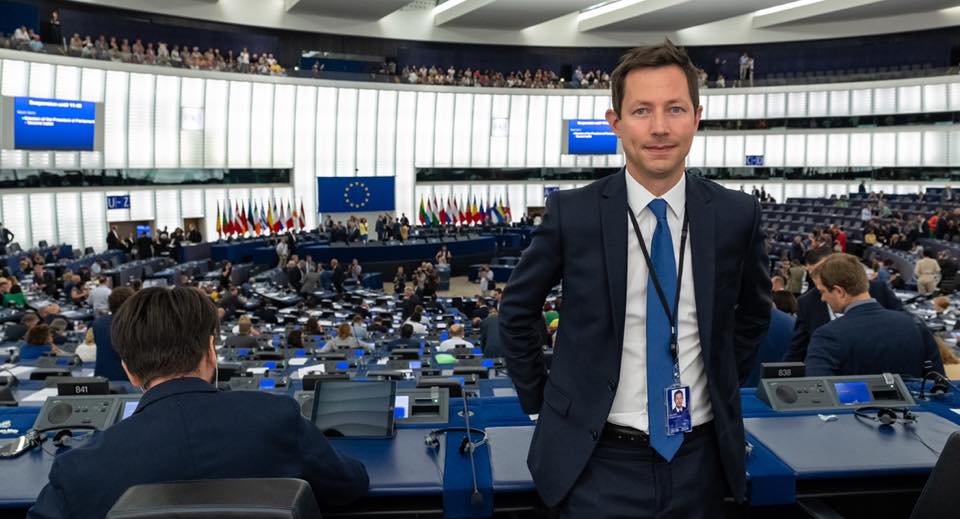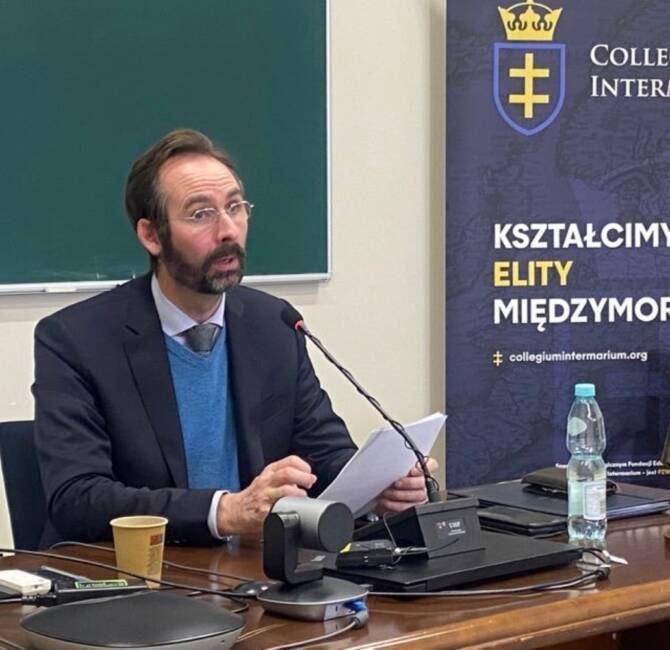Hungary — Interview with Rodrigo Ballester, director of the Centre for European Studies at the Mathias Corvinus Collegium in Hungary: “Open-mindedness, critical thinking and freedom of tone are important to us, contrary to the Cancel Culture that wreaks havoc in the West.”
Rodrigo Ballester is a former European civil servant from the College of Europe, and was notably a member of the cabinet of the Commissioner for Education and Culture from 2014 to 2019. He teaches at Sciences-Po Paris (Dijon Campus) since 2008. Thibaud Gibelin, currently visiting researcher at the Mathias Corvinus Collegium, asked him about the objectives of the MCC, the future of the European Union and the place countries of Central and Eastern Europe occupy within this community.
Thibaud Gibelin: The MCC has taken on an unprecedented scope in recent years. Can you tell us about the different purposes of this private university?
Rodrigo Ballester: It is an educational UFO. To begin with, it denies the prevailing fatalism fuelled by the collapse of university teaching in the West. Our youth are not condemned to a decadent education, and the MCC is proving it. By reconnecting with classic fundamentals, we can build successful educational projects. Open-mindedness, critical thinking and freedom of tone are important to us, contrary to the Cancel Culture that is wreaking havoc in the West. This is why many American academics, of various sensitivities, join us. As an example, we are currently welcoming Peter Boghossian, liberal philosopher and militant atheist: he was the subject of a witch hunt led by the “woke” movement until he finally threw in the towel and left the University of Portland.
The MCC intends to prepare a whole age group, by selecting bright young people from all over Hungary: our meritocracy is not limited to Budapest. Pupils and students obtain a scholarship and accommodation. The MCC offers complementary courses. The students go to their respective universities and in the evening they receive additional training, with smaller classes. We advocate for a “Renaissance” culture in order to escape contemporary hyper-specialisation.
Finally, the MCC wishes to develop within its walls a sense of community in service to patriotic dedication.
Thibaud Gibelin: Your involvement in teaching is not new. For two years you were a course assistant at the College of Bruges; since 2010 you have been a visiting professor in European law at Sciences-Po Paris. This pedagogical dimension has been a major part of your activity since you headed the Center for European Studies at the MCC. What training and activities does this center offer?
Rodrigo Ballester: It is all about rethinking the European Union and understanding its nuances. We discard two caricatures: the “no salvation outside the EU” trope as much as the refrain of getting rid of a useless burden, as if the EU had never been useful. Between the federalists (including those who do not face up to it) and the nihilists, my Europe is pragmatic, respectful of national sensitivities, of subsidiarity and is centred on economic cooperation. Basically, Europe before Maastricht, a treaty which allowed for a big political leap and which, in my opinion, ended the honeymoon between the EU and its citizens.
In addition, we prepare students for the professional world, by instilling in them the skills that they are not necessarily taught on university benches. Alongside questions of ethics, we insist on critical thinking and intellectual honesty, all applied to European affairs. We also make them understand the ambitions of Central Europe vis-à-vis the European Union or the way in which the Visegrád Group operates, which is gaining increasing weight in the European game.
Thibaud Gibelin: What career prospects do your European Affairs students envision?
Rodrigo Ballester: We wish for them several lives: neither exclusively civil servants nor only consultants, and that they never lose the taste for learning and training. The private sector attracts the majority of our students, followed by national administration. A career in the European institutions is a less popular choice because it is difficult for a Hungarian student to go abroad, it is not their natural choice. They often do it reluctantly and rarely for the entirety of their career.
Thibaud Gibelin: You have been familiar with the mysteries of European politics since you completed your Masters in Law at the College of Europe in Brugge in the early 2000s. Since 2008, you have been a European civil servant. How do you view the evolution of the EU over the past 20 years?
Rodrigo Ballester: I have a critical and disillusioned point of view. First, by having the certainty that the integration of Central Europe is comparable to an unwanted child and that the West still does not understand either the Centre or the East of the continent. Then because of the political, not to say ideological, drift that characterises the Maastrichtian EU. I see a severance since the Maastricht Treaty, which is celebrating its thirtieth anniversary this year. The EU was a prosperity building machine, restrained by its founding principles and respectful of true cultural and political diversity. The crucial principles of subsidiarity and allocation of competences were respected; we did not go beyond what the Member States had delegated. Federalist tendencies were only embryonic. With Maastricht all this is changing slowly but surely. Economic logic becomes political, up to the climax of the European constitution draft – which was aborted. But a subconscience remained, and I have the impression that today a post-national obsession is at work, contrary to basic pragmatism.
The general interest of the 27 gives way to the “common values” mantra except that the more they are preached and imposed, the more EU Member States’ trust in each other is undermined. This is not the least of its paradoxes.
Thibaud Gibelin: France played a role in the Maastrichtian turning point with the Delors Commission (1985-1995). Neoliberalism was promoted on a continental scale by French socialists who had converted to economic liberalism after their austerity U-turn in 1983. So much so that this Anglo-Saxon evolution owes a lot to France. How do you analyse the role of France in the service of a more centralised and more ideologised European Union?
Rodrigo Ballester: France played an important role, notably with François Mitterrand. This brilliant, cultivated and steeped in history spirit had espoused this proto-federal vision even when he was defending the interests of France. The legacy of this turning point is the euro. In compensation for German reunification, François Mitterrand wanted West Germany to dilute its currency.
However, it is not the mark that has been diluted in the euro, but national currencies that got diluted into a European mark called the euro, which is a good example of back-door federalism
Thibaud Gibelin: Recently, the European Commission issued a “post-civilisation” politeness guide, testifying to the advanced hold of woke ideology in EU ruling circles. Conversely, the Hungarian government is organising a referendum next spring aimed at protecting society from LGBT activism, as well as guaranteeing the role and responsibility of parents in sex education. How to analyse this radical divergence between Budapest and Brussels? What can be the consequences?
Rodrigo Ballester: Right off the bat: there shouldn’t be any. As a lawyer, I am attached to the principle of subsidiarity and the allocation of powers. The issues you have just mentioned should never be on the European table. These are national jurisdictions, period. I believe in a European Union where countries that are ideologically and culturally diverse live side by side and it is in no way appropriate for the EU to take sides in these national debates.
If the EU were a 27-storey building, I would be happy if the trustee – the Commission – took care of the common areas, but above all did not interfere in the education of your children or dictate convictions!
Take the example of euthanasia, which Hungary very much disapproves. Personally, I am opposed to it, but if the Belgians decide to legalise it, well it is their sovereign decision, period. Ditto for gender theory in schools. If the political balance of power in France leads to this (which I personally find absurd) let France do it, but let Hungary be free not to do so without paying a political or financial price. Central Europe is respectful of the decisions of its western neighbours, but the reverse is only rarely true.
Unfortunately, this has become a European debate because, instead of a pragmatic Europe, we have a messianic EU, which stands on the vague principles of article 2 exploited in a partisan way to introduce a determined ideology. It is a “values” hold-up in order to impose an ideological vision of these “values”.
Thibaud Gibelin: From a seemingly non-binding article 2 of the Treaty on European Union, through pulling of the thread, we end up with extremely radical and effective demands. The boomerang of morality is right back in economic pragmatism. Thus, in December 2020, in a troubled context, Poland and Hungary validated their recovery plan and the 2021-2027 multi-annual budget, together with a new mechanism making the payment of EU funds conditioned to a country’s respect for the rule of law. What does this innovation tell us about the evolution of the EU?
Rodrigo Ballester: This is one more milestone towards the back-door establishment of a proto-federalist state. This conditionality seems dangerous to me because the notion of the rule of law is vague enough to be politically manipulated. If it is a question of checking that European money is not embezzled, then very well, excellent idea. But if it is a question of conditioning European funds to an ideological agenda under the pretext of the rule of law, then this is an unacceptable drift.
Is that the case? Partially yes: the reasons why Hungary and Poland still haven’t received their due stimulus funds seem very vague to me, too vague.
The question is whether in order to obtain the payment of these funds, it is necessary to spread gender theory in nursery schools. That’s the question. They decree overnight that it is a European value, in this case non-discrimination, and that’s it. And will our wallet be hit in case of refusal? Apparently so, yes.
On the other hnd, the recent judgment of the Court of Justice provides some clarifying elements which frame the use of this legal weapon. But all the same, the risk of deviation is real, especially at the level of a Commission which is under pressure from an absolutely dogmatic and hysterical Parliament regarding these issues. The modus operandi bothers me: we put a vague legal concept in a regulation, and then we give the Commission very wide leeway to implement it under the urgent gaze of Parliament. The Commission is a political institution, composed of Commissioners who have political affiliations, appointed by Member States of a certain political orientation. Some have even been candidates in European elections as Spitzenkandidat for such and such party, it is necessarily politicised! We are in the process of granting a judicial role to a political organisation which can, moreover, decide at its discretion whether or not to prosecute a State. If that’s not a risk of arbitrariness, it sure looks a lot like it…
Thibaud Gibelin: Your analysis of the situation is made all the more meaningful as you have worked for a long time as a European civil servant at the Commission. In the current configuration, the Brussels sphere clearly weighs on the development of the continent. How do you compare the conservative-leaning Hungarian political elites to the European civil service? Can Brussels’ elites understand European public interest? What is their margin of deviation, for lack of cultural roots and historical seniority?
Rodrigo Ballester: It is indeed a question of lack of roots and distance from the field and the citizens they serve. I do not believe that European officials are in bad faith, on the contrary, I believe that they are steeped in good faith. But the fact remains that they are completely out of touch, they live in a bubble and I would even say that their excessive salaries and their stifling social grouping contribute to isolating them from reality. This contributes to making them the involuntary mandarins of a certain ideology which feeds itself back.
This is also valid for MEPs who tend to think and deliberate in the same way. The European People’s Party (EPP), for example, is a party of conservative voters who elect progressive politicians who do not represent them.
There is a general disconnection with EU: with the reality of the field, with European citizens and Member States. That is to say, with its sources of legitimacy. What’s the result? The Brussels bubble sticks to a federal agenda, benignly assuming that it is widely contested outside of their meeting rooms.
Thibaud Gibelin: On February 16, the EU’s Court of Justice delivered its judgment on the conditionality of European funds. This decision comes in a tense electoral climate, since the general elections in Hungary are taking place on 3rd April. How do you envisage the confrontation, which seems to be a long-term one, between the European institutions on the one hand and Poland and Hungary on the other.
Rodrigo Ballester: I have already mentioned that this judgment brings a certain dose of legal rationality to a hysterical debate, even if it does not resolve all the unknowns and grey areas of the new totem of conditionality. That said, the political debate around “values” has far from dried up; on the contrary, some (certain parliamentarians in particular) will not hesitate to brandish it like a sword of Damocles or like an instrument of political and media hype at every time a country dares to contradict them.
The question of these values, amplified by the woke delirium, is so divisive that I even see the risk of a schism between those who make it a dogma and others. The mistake is to think that this cleavage only concerns the Visegrad four. This is false, it is a transversal divide running through the entire continent. There are conservatives in all EU countries, they account for a good third of voters, or even more.
What are we going to do, ostracise them on the grounds that the EU has become a progressive club in which conservatives no longer have a place? That a supranational power seizes social issues, arguably pushed by very active minorities, which do not fall within the scope of abilities of the EU or Europeans’ priorities, and make it a condition for obtaining funds, it’s mind-boggling.
Furthermore, what bothers me most is the shameless “double standard” between member states. Let us compare Spain, a country governed by decrees, whose balance of power is mishandled, whose public institutions (in particular the public prosecutor or public television) are colonised, etc. And no one says anything, not a single criticism, not a single wave, neither in Brussels nor elsewhere. There is a tendency to point out the motes in the eyes of Poland and Hungary and ignore the huge beams in the eyes of other countries. Why? Is it a problem with the rule of law or the fact that they are politically conservative and geographically in Central Europe? Frankly, one unfortunately has to ask the question.




